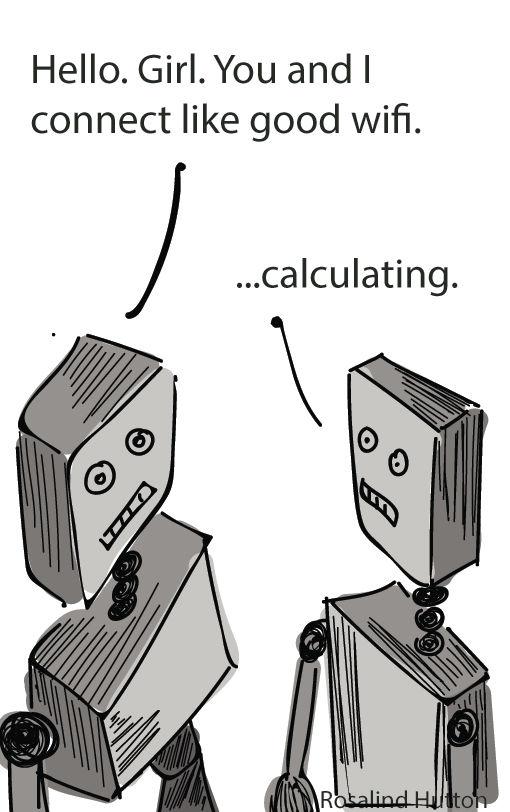Love is in the air as we exit this winter and surge into spring.
Every year, most find themselves reluctantly dealing with the major romantic holiday, Valentine’s Day. Single people either ignore it completely or go on an ice-cream binge, crying while viewing romantic comedies. Those who have significant others are stuck in a competitive showcase of affection, one-upping their devotion with grand displays of romanticism.
Regardless of how you feel toward the holiday, I am sure you have noticed we do not approach relationships like previous generations. Sure, we still exchange flowers, candy and other abrasive gifts that are slightly nauseating to our friends, but the concept of romance and social interaction has altered completely.
Gone are the archaic days of drawn out letter correspondence, challenging men with the potential chance to view exposed ankles. The edgy and slightly “extreme” 90’s no longer offer physical photos or mix-tapes. Imagination and self-restraint have quickly evaporated into the always connected culture of this era.
Online dating, social media, texts, video chats and various other forms of information have warped our social skills and our overall sex drive. While slightly exaggerated, I guarantee your approach to social interaction has been altered by the Information Age.
As we have aged in this digital era, the additional information and stress is far more than previous generations. Comedian Aziz Ansari and New York University sociology professor Eric Klinenberg, wrote a comedic research book in 2015 titled “Modern Romance.” Their goal was to investigate the nuances of this era’s digital romance, leading to extraordinary results. One fascinating tidbit according to their study is one third of couples who married between 2005 and 2012, met through online dating.
Additionally, Lisa Damour of The New York Times met several conclusions with her own research. She believes in several positive technological benefits, including how rates of teenage births and sexually transmitted infections have dropped in communities with improving high-speed internet access.
Instantaneous communication, shared social databases and stored backlogs of user posts allow for couples and friends to learn about each other far faster than before. Even with many irritations, technology has only improved our romantic and social lives.
Studies have tested the human impact of technology for decades, including a major 2007 study in The Journal of Clinical Endocrinology & Metabolism by Thomas G. Travison of New England Research Institutes. The study found a decline in testosterone levels in American men. Revealing radical results, the average testosterone level of both teenagers and grown men has decreased by about 1 percent per year since the 1980s.
Lower testosterone causes loss of sex drive, loss of muscle mass, low motivation or other various symptoms. The ease of access to online pornography, rampant diagnosis of PIED and a significant increase in masturbation rates do not help this data either. The hard data shows our dopamine dependence is seriously impacting our way of life, doing harm in unintended ways.
Marine Rolland and Joëlle le Moal performed research with over 25,000 European partners regarding lower sperm count to publish for their journal, “Human Reproduction.” Researching the whole of France in a 17-year period, there was a continuous decrease in semen concentration of about 1.9 percent per year.
This constitutes a serious public health warning, as the link to these results is yet to be determined. Many factors could have triggered these results, but the sample rates were taken from 1989 to 2005. A simple stretch of the imagination easily ties the rise of computing and less physical activity to reach those results.
Increased mental stimulation over time, overall screen time with UV light and dopamine spikes have disrupted natural sleep patterns and other factors of our mammalian biology. While not concrete, the data is only reporting these results following the massive shift in our society from physical labor to a technological approach.
Please note I am no expert when it comes to love or standard social skills. Growing up with a preference toward technology has detached me from others, so this is primarily just research.
If you are single, I guarantee you will eventually find someone who matches your mental state. For couples, perhaps dialing back the obsessive technology stance would give your relationship a much-needed check-up.
Humans are social animals, so working on interactive skills can help you find friends and loved ones. Regardless of your relationship status or how you factor technology into your daily interaction, I do hope you have a fantastic Valentine’s Day.
The Information Age has altered not only our behavior, but our relationships as well
About the Contributor

Brandon Grisham, Former Online Editor
Brandon Grisham served as the Online Editor from 2019 to 2020.
He also started The Reflector's digital archive, dubbed the "Grisham Archive Project."






















































































